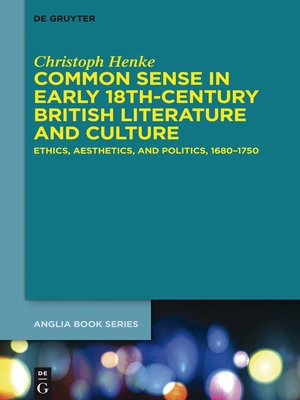Common Sense in Early 18th-Century British Literature and Culture
ebook ∣ Ethics, Aesthetics, and Politics, 1680–1750 · Buchreihe der Anglia / Anglia Book Series
By Christoph Henke

Sign up to save your library
With an OverDrive account, you can save your favorite libraries for at-a-glance information about availability. Find out more about OverDrive accounts.
Find this title in Libby, the library reading app by OverDrive.



Search for a digital library with this title
Title found at these libraries:
| Loading... |
While the popular talk of English common sense in the eighteenth century might seem a by-product of familiar Enlightenment discourses of rationalism and empiricism, this book argues that terms such as 'common sense' or 'good sense' are not simply synonyms of applied reason. On the contrary, the discourse of common sense is shaped by a defensive impulse against the totalizing intellectual regimes of the Enlightenment and the cultural climate of change they promote, in order to contain the unbounded discursive proliferation of modern learning. Hence, common sense discourse has a vital regulatory function in cultural negotiations of political and intellectual change in eighteenth-century Britain against the backdrop of patriotic national self-concepts. This study discusses early eighteenth-century common sense in four broad complexes, as to its discursive functions that are ethical (which at that time implies aesthetic as well), transgressive (as a corrective), political (in patriotic constructs of the nation), and repressive (of otherness). The selection of texts in this study strikes a balance between dominant literary culture – Swift, Pope, Defoe, Fielding, Johnson – and the periphery, such as pamphlets and magazine essays, satiric poems and patriotic songs.






